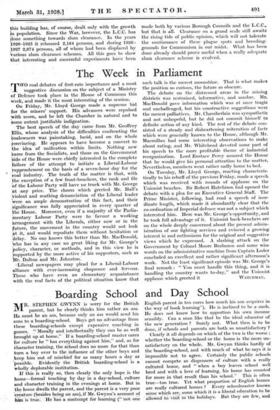The Week in Parliament WO coal debates of first-rate importance
and a most T suggestive discussion on the subject of a Ministry of Defence took place in the House of Commons this week; and made it the most interesting of the session; On Friday; Mr. Lloyd George made a supreme bid for the miners' support. His advances were repulsed with scorn, and he left the Chamber in natural and to some extent justifiable indignation.
The best speech of the day came, from Mr. Geoffrey Ellis, whose analysis of the difficulties confronting the Coalowners was painstaking, lucid, and on the whole convincing. He appears to have become a convert to the idea of unification within limits. Nothing new 'came from the Socialists, and those on the Government 'side of the House were chiefly interested in the complete failure of the attempt to initiate a Liberal-Labour rapprochement on the basis of a seven-hour day for the coal industry. The truth of the matter is that, with the exception of a few front-benchers, the rank and file of the Labour Party will have no truck with Mr. George at •any price. The cheers which greeted Mr. Hall's ;violent and scathing denunciation.- of the Liberal leader were an ample demonstration of this fact, and their significance was fully appreciated in every quarter of the House. Moreover, even if a majority of the Parlia- mentary Labour Party were to - favour a working 'arrangement with the Liberals, either now or in the future, the movement in the country would not look at it, and would repudiate them without hesitation or delay. No one knows this better than Mr. MacDonald; veslio has in any case no great liking for Mr. George's policy, character, or methods, and in this view he is upported by the more active of his supporters, such as Mr. Dalton and Mr. Johnston.
-Liberal newspapers may plead for a Liberal-Labour alliance with ever-increasing eloquence and fervour. Those who have even an elementary acquaintance with the real facts of the political situation know that such talk is the merest moonshine. That is what makes the position so curious, the future so obscure. • The debate on :the distressed areas in the mining district's was restrained; informative, and sombre. Mr. MacDonald gave information which was at once tragic and unchallenged, but his constructive suggestions. were the merest palliatives. Mr. Chamberlain was sympathetic and not unhopeful, but he did not commit himself to definite action of any kind. The rest of the debate con- sisted of a steady and disheartening reiteration of facts which were generally known to the House, although Mr. Macmillan had some interesting observations to make about rating, and Mr. Whitehead devoted some part of his speech to the more profitable theme of industrial reorganization. Lord Eustace Percy assured the House that he would give his personal attention to the matter. Nevertheless; members went rather sadly home to bed.
On Tuesday, Mr. Lloyd George, reacting characteris- tically to his rebuff of the previous Friday, made a speech which was received with rounds of applause on the Unionist benches. Sir Robert Hutchison had opened the debate with a plea for an Executive General Staff. The Prime Minister, following, had read a speech of inor- dinate length, which made it abundantly clear that the co-ordination Of Imperial defence was not a subject which interested him. Here was Mr. George's opportunity, and he took full advantage of it. Unionist back-benchers are on the whole deeply concerned about the present admin- istration of our fighting services and evinced a growing interest in and enthusiasm for the original and suggestive views which he expressed. A slashing attack on the Government by Colonel Moore Brabazon and some wise words on the administrative machine from Captain Loder concluded an excellent and rather significant afternoon's work. Not the least significant episode was Mr. George's final remark : " You must handle this thing, and it is handling the country wants to-day," and the Unionist


































 Previous page
Previous page